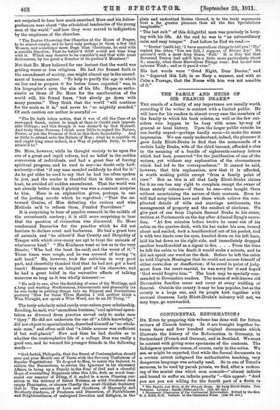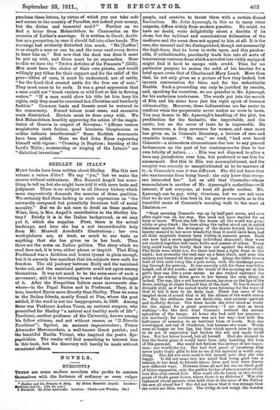CONTINENTAL REFORMATION.f
Da. KIDD by preparing this volume has done well for future writers of Church history. In it are brought together be- tween three and four hundred original documents which illustrate the history of the Reformation in Germany, in Switzerland (French and German), and in Scotland. We musb be content with giving some specimens of the contents. The Indulgence question comes, of course, early in the series. We see, as might be expected, that while the formal documents to a certain extent safeguard the authoritative teaching, very dangerous language was actually used. So in one of Tetzel's sermons, to be used by parish priests, we find, after a reckon- ing of the mortal sins which men commit—" almost infinite and bound to suffer an infinite penalty "—this appeal: "And you are you not willing for the fourth part of a florin to • The Family and Heirs of Sir Francis Drake. By Lady Eliott-Brake. Two Volumes. London : Smith, Elder and Co. [31s. 6d. net.] 1' Documents Illustrative of ohs Continental Reformation. Edited by the Bev. B. J. Kidd, D.D. Orford: at the Clarendon Press. [12s. 6d, net.] purchase these letters, by virtue of which you can take safe and secure to the country of Paradise, not indeed your money, but the divine and immortal soul P" Further on we find a letter from Melanchthon to Camerarius on the occasion of Luther's marriage. It is written in Greek, doubt- less as a precaution, in case it should fall into other hands. The marriage had evidently disturbed him much. " He [Luther] is as simple a man as can be, and the nuns used every device to draw him on." But now that the deed was done it must be put up with, and there must be no reproaches. Near to this we have the "Twelve Articles of the Peasants" (1525). Men must have the choice of their own priests, and would willingly pay tithes for their support and for the relief of the poor—tithes of corn, it must be understood, not of cattle, " for the Lord God created cattle for the free use of man." They must cease to be serfs. It was a great oppression that a man could not " touch venison or wild fowl or fish in flowing waters." " If a man could show his title let him keep his rights, only they must be exercised in a Christian and brotherly fashion." Common lands and forests must be restored to the community. Forced labour must cease, and excessive rents diminished. Heriots must be done away with. We find Melanchthon heartily approving the action of the magis- trates of Geneva in respect of Servetus " Affirm° vestros magistratus iuste fecisse, quod hominem blasphemum re ordine iudicata interfecerunt." Some Scottish documents have been added. Here we find John Knox expressing himself with vigour : "Crossing in Baptism; kneeling at the Lord's Table ; mnmmeting or singing of the Letanie" are " diabolical inventions."







































 Previous page
Previous page